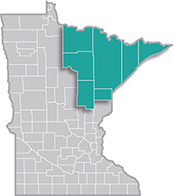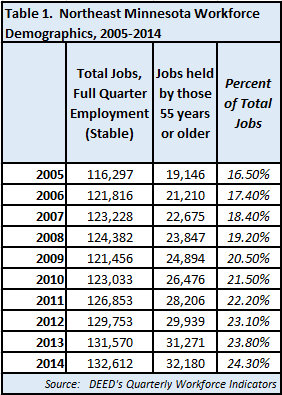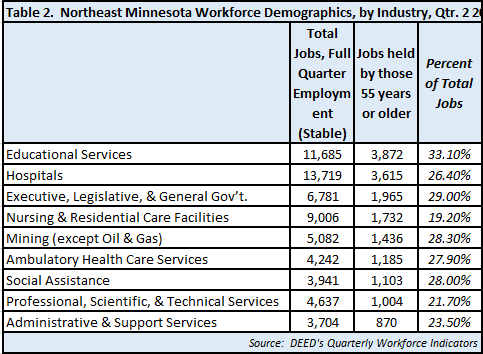 Home to the state's second-largest metro, the Northeast Region has a strong industrial sector, tied largely to the area's abundant natural resources.
Home to the state's second-largest metro, the Northeast Region has a strong industrial sector, tied largely to the area's abundant natural resources.
Most of the manufacturing base centers on mining and forest products industries. More than half of the sector's employment is in paper and machinery manufacturing.
Want the freshest data delivered by email? Subscribe to our regional newsletters.
8/17/2015 10:31:51 AM
Erik White
With Millennials entering the workforce and Baby Boomers preparing their exit, the workforce has undergone significant transformation since the start of the century. The Baby Boom generation - those born between 1946 and 1964 - make up the largest generation in the population and are approaching the age of retirement from the workforce. This demographic trend is reflected in the growth of the number of jobs held by workers aged 55 years and over.
Using the Quarterly Workforce Indicators data program and focusing just on the variable of Full Quarter Employment (Stable) - which measures the number of jobs that are held on both the first and last day of the quarter with the same employer - we can determine the age of jobholders in the region. Since 2005, there has been an increase of about 13,000 jobs held by workers aged 55 years or older in Northeast Minnesota. This age cohort held about 16.5% of the total jobs in 2005, but now holds 24.3% of all jobs (See Table 1).

Table 2 uses the same dataset and variable to determine the industries that have the greatest amount of and reliance on older workers in Northeast Minnesota. Education and Health Services - including schools, hospitals, nursing homes, clinics, and social assistance - have about 10,000 jobs that are held by older workers. Local government, mining, and professional and technical services are other industries that have large numbers and high percentages of jobs that are held by older workers.

Due to the age of the workforce in these industries, there will be a need to replace these workers as they reach the age of retirement, which could cause stress or limit the region's potential growth. While attraction and retention of younger workers will be an important strategy, industries shouldn't forget about continuing to work with those who are older.
Older workers are often seen as valuable to the workplace because they bring values of loyalty, reliability, productivity, as well as a wealth of experience and belief in a job well-done. Not to mention that you typically don't need to tell them to put away their phones or that their appearance needs to be more professional. But there are other challenges that can affect the contributions of older workers.
In addition to the natural aging of the workforce, perhaps the most prominent change since the turn of the century is the advancement of technology and its role in the workplace. Job duties have changed and new types of jobs have been created to incorporate the technology upgrades.
The advancement and prominence of technology in the workplace can be a barrier for older workers seeking employment even as older adults have increasingly embraced technology in their everyday life. For older workers, even finding out what jobs are available can be a burden as newspaper classifieds are no longer the main source for employment opportunities. Instead, most job banks are online and many applications are now done on a computer; and it might take much longer to hear back from the employer during the hiring process than in the past. Technological skills will need to be gained, especially for those who haven't worked for a while, but training can be hard to find.
The best resource for those seeking employment, especially those who are older, is your local WorkForce Center. Jobseekers will find friendly and helpful staff who can offer advice and guidance ranging from an introduction to MinnesotaWorks, Minnesota's online job bank, to trainings on basic computer skills and interview and resume reviews. The WorkForce Center is your one-stop shop for overcoming the challenges of getting a job.
Contact Erik White at 218-302-8413.